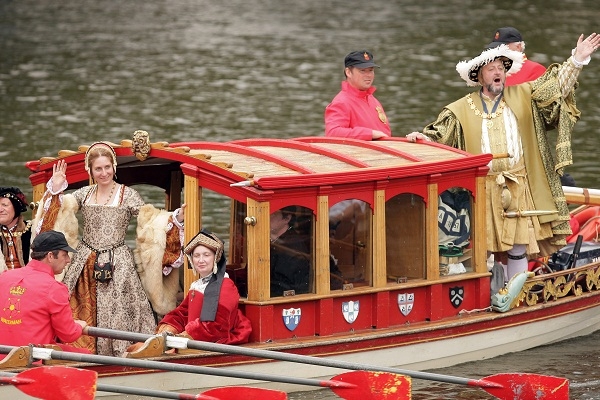‘Pastime with good company’, attributed to Henry VIII
Pastime with good company
I love and shall until I die.
Grudge who list, but none deny,
So God be pleased, thus live will I.
For my pastance,
Hunt, sing and dance,
My heart is set.
All goodly sport
For my comfort
Who shall me let?
Youth must have some dalliance,
Of good or ill some pastance.
Company me thinks the best
All thoughts and fancies to digest.
For idleness
Is chief mistress
Of vices all.
Then who can say
But mirth and play
Is best of all?
Company with honesty
Is virtue, vices to flee;
Company is good and ill,
But everyman has his free will.
The best ensue,
The worst eschew!
My mind shall be
Virtue to use,
Vice to refuse;
Thus shall I use me.
It was Jacqueline Kennedy who first described JFK’s White House as an American Camelot. That was in an interview just after her husband’s assassination. Jackie didn’t have time to mention that while Queen Guinevere was the one who went in for extra-martial affairs in Camelot, her own husband had collected enough lovers to fill his own Round Table. But JFK wouldn’t have been JFK without the skirt-chasing. Lots of people have wanted their own Camelot. If you go to Winchester you can see a round table which Edward I had made. It was repainted a few hundred years later by Henry VIII who had a Tudor Rose added to it along with portrait of himself as King Arthur. Jackie Kennedy was being romantic when she suggested her husband had been Arthur’s successor – Henry meant it literally.
One of the claims his father Henry VII made, before and after he defeated Richard III at the Battle of Bosworth Field, was that he was Arthur’s true heir. The genealogy is complicated but the basic idea is that King Arthur was king of the ancient Britons who ended up in Wales after successive invasions by Saxons, Vikings, and Normans. Half of Henry VII’s family was Welsh; ergo he represented the ancient British line. A bit of a stretch, but good enough for the early Tudors to make use of the red dragon as a badge (associated with Arthur and his father Uther Pendragon) and for Henry VII to name his eldest son Arthur, who died when he was only fifteen leaving his younger brother to become Henry VIII.
Henry was determined to be a magnificent ruler. He thought of himself primarily as a martial leader, dreaming of conquest and promoting a chivalric culture of aristocratic tournaments and ceremony. Like JFK he also had his women. His court, like Kennedy’s, was a place of pleasure and power. But it was also a place of culture. Henry was known for his learning (especially in theology) and his skill as a composer. The biggest stars of contemporary humanism paid him compliments and visits. Kennedy had Marilyn Monroe. Henry had Erasmus.
‘Pastime with good company’, and the music that goes with it, have long been associated with Henry. They represent much of what he wanted to stand for. A joyful commitment to the good things in life combined with a commitment to real virtue. ‘Virtue’ is best understood here as a renaissance ideal of things done well. The virtuous prince would excel at those things which are appropriate to his station – fighting, dispensing justice, promoting the common good. Virtue in this sense describes a whole way of life. How to achieve it?
The answer, according to Henry’s song, is ‘Pastime with good company’. The lyrics begin like a libertine celebration of hedonism: to ‘hunt, sing and dance, my heart is set’. ‘So God be pleased, thus live will I’ seems more defiant than pious. The second stanza introduces a justification for hard partying which appears to be a joke: ‘idleness is chief mistress of vices all’. If the devil makes work for idle thumbs, best to keep those thumbs busy doing anything at all. The reasoning is obviously spurious.
In the third stanza, however, things get serious. Good company becomes ‘good’ in two senses – it is enjoyable and it promotes virtue. This doesn’t mean following the rules. It’s an aristocratic vision of how to live the good life: ‘Company with honesty is virtue’. Of course a bad crowd can lead you astray, but only if you let it: ‘everyman has his free will. The best ensue, The worst eschew!’. But in Camelot virtue is assumed (we’re all gentleman after all). It is a place where extraordinary people do extraordinary things. Excess, be it to ‘hunt, sing and dance’ or to take a string of mistresses, is all a part of that, as integral to the myth of ‘bluff King Hal’ as to that of JFK.
A man who is going to fight for his nation, to give justice to it, to care for each and every one of his subjects, is going to have to be larger than life. Modern Camelots are a place where living people, fallible and selfish as they may be, can become myths in their own time. The attraction to those who hold power is obvious. More interesting is the willingness of those they rule to buy into those myths. Why does the Kennedy legend endure? Partly, no doubt, because many of us would like to live in a world where heroes are possible. Even in politics.






Comments